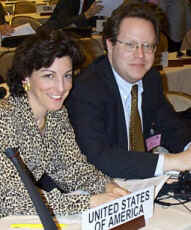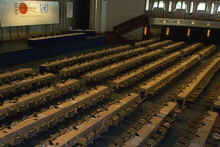Published by the International Institute for Sustainable Development
(IISD)
Vol. 12 No. 83
Wednesday, June 10 1998
HIGHLIGHTS FROM THE MEETINGS OF THE FCCC SUBSIDIARY BODIES
9 JUNE 1998
The Ad Hoc Group on Article 13 (AG13) met in the morning and afternoon. Contact groups
from the Subsidiary Body for Implementation (SBI) and the Subsidiary Body for Scientific
and Technical Advice (SBSTA) met throughout the day to consider outstanding issues.
AD HOC GROUP ON ARTICLE 13
AG13 continued deliberations on size of the Committee and representation. The  US
said that the Committee was the first under the Convention and is not compelled to follow
the UN system of apportionment. He called for consideration of the special obligations of
Annex I and Annex II Parties who undertake the "lion's share of the implementation of
the Convention." He reiterated the US position on the designation of half the members
by Annex I Parties and the other half by non-Annex I Parties and suggested brackets around
"equitable geographical distribution." The G-77/CHINA opposed the US proposal
saying that the group will not undermine well-established UN practices on equitable
geographical distribution and rotation principles. He said that the group was ready to
show flexibility on the size of the Committee. US
said that the Committee was the first under the Convention and is not compelled to follow
the UN system of apportionment. He called for consideration of the special obligations of
Annex I and Annex II Parties who undertake the "lion's share of the implementation of
the Convention." He reiterated the US position on the designation of half the members
by Annex I Parties and the other half by non-Annex I Parties and suggested brackets around
"equitable geographical distribution." The G-77/CHINA opposed the US proposal
saying that the group will not undermine well-established UN practices on equitable
geographical distribution and rotation principles. He said that the group was ready to
show flexibility on the size of the Committee.
The G-77/CHINA said that the introduction of new bracketed text was unacceptable at
this point. The Chair proposed that the US, Ghana, Indonesia, Canada, Egypt and the EU
form a small group to try and resolve the issues. In the afternoon, the EU, on behalf of
the small group, reported that no consensus on the issues had been reached. The delegates
continued deliberating on the issues and the language used in the report on the work of
AG13, and the small group reconvened again to try and resolve the two outstanding issues.
As of 8pm, no decision had been reached.
CONTACT GROUPS
 Technology: In the contact group on technology, delegates considered proposed draft
conclusions from the Chair on development and transfer of technology. The draft
conclusions note the results of the expanded technology and technology needs survey.
Regarding language identifying non-Annex I communications as an important means of
identifying technology needs, debate centered on a proposal noting that a lack of funding
prevented many non-Annex I countries from submitting their national communications. A
number of developed countries objected, noting their efforts to accelerate funding and
stating that national communications are not the only available avenue for addressing
technological needs. Several delegations also objected to language requesting that GEF
give high priority to identifying technology needs, noting that SBI has the responsibility
to guide the GEF in this regard.
Technology: In the contact group on technology, delegates considered proposed draft
conclusions from the Chair on development and transfer of technology. The draft
conclusions note the results of the expanded technology and technology needs survey.
Regarding language identifying non-Annex I communications as an important means of
identifying technology needs, debate centered on a proposal noting that a lack of funding
prevented many non-Annex I countries from submitting their national communications. A
number of developed countries objected, noting their efforts to accelerate funding and
stating that national communications are not the only available avenue for addressing
technological needs. Several delegations also objected to language requesting that GEF
give high priority to identifying technology needs, noting that SBI has the responsibility
to guide the GEF in this regard.
The conclusions noted the result of consultations by the Secretariat on (an)
international technology information centre(s), as well as enhanced national or regional
centres. The conclusions proposed that SBSTA, inter alia, urge the SBI to request the GEF
to give a high priority to activities that enhance the capacity of national and regional
technology information centres. A number of developed countries said it was far too early
to set priorities and suggested inviting further comments from Parties. They noted the
absence of clear guidance on the service desired. Proposals were made to acknowledge that
such centres already exist and that access should be improved. The group will reconvene on
Wednesday.
One group of countries proposed draft decisions for COP-4 on technology transfer and
capacity building, but several delegations requested time to consider the proposals and
noted that the contact group was tasked to produce only SBSTA conclusions.
Land Use Change and Forestry: The contact group on Land Use Change and Forestry met in
the afternoon and the evening. In the afternoon, delegates reviewed draft SBSTA
conclusions. Debate centered on paragraphs related to the timing and content of an IPCC
workshop, report and Third Assessment Report. Delegates made a series of proposals on the
draft conclusions, which were compiled into a revised text with brackets.
As of 8pm, delegates began consideration of a revised draft text. Under the revised
text, SBSTA would request the Secretariat to organize a workshop prior to COP-4 with
participation by experts nominated by the IPCC. The purpose of the workshop would be to
consider [as the first priority] the data availability and definitions used by Parties and
international organizations. It would also agree [to consider at its session] or [to hold]
a second workshop after COP-4 to focus [more specifically] on issues arising from Article
3.4 and comments submitted by Parties.
The revised text also contained two alternative paragraphs on the IPCC report. Under
the first alternative, SBSTA would request the IPCC to make available a [special] report
on land-use, land use changes and forestry [in a timely manner], [no later than June 2000]
or [if possible by COP-5, but no later than six months prior to COP-6]. The paragraph
specifies that the IPCC should address the methodological, scientific and technical
implications of the relevant Articles of the Protocol. Under the second alternative, the
[special] report should address the methodological and technical implications of [Articles
3.3, 3.4, 3.7 and 7.1] of the Protocol. IPCC would also set the overall scientific context
for consideration of LUCF [and agricultural soils] activities. Bracketed text would also
have the IPCC address activities under Article 3.4 and those not covered by Article 3.3,
including: improvements in forest management, soil and forest conservation; and
re-vegetation of degraded lands.
Allocation of Work for COP-5: The SBI/SBSTA contact group on allocation of work for
COP-5 met to discuss a Co-Chairs' set of draft conclusions. A representative of a group of
developing countries objected to the proliferation of contact groups. There was general
agreement that this contact group should only meet after other groups.
Several developed country and group representatives expressed satisfaction with the
draft paper, one noting, in particular, the inclusion of tasks addressing the Kyoto
Protocol's Article on compliance issues. One Party noted the omission of emissions
trading. The Secretariat responded that this contact group's agenda item topic refers to
allocation of work for COP/MOP-1 only, and the Kyoto Protocol does not mandate these
issues to be addressed then; furthermore, a decision on emissions trading is expected from
the contact group on mechanisms. Another Party suggested improving the structure of the
document, currently with "Task," "Allocation," and "Programme of
work" up to COP-5 in tabular form, by identifying inter-linkages between elements of
the work programme and organizing it according to goals, priorities, timelines and
strategies. Two Parties asked about deadlines, to which the Chair replied it is up to the
Parties. The Chair asked for written inputs for the next meeting, on Thursday.
Adverse Impacts: The contact group on adverse impacts met in the afternoon to discuss a
Co-Chairs' compilation of written inputs and draft decision. The Chair announced inputs
had been received from three Parties/regional groups and noted the text is not
"final." He also noted that some Parties have drawn a distinction between
impacts of climate change and the impacts of response policies. One Party favored not
making such a distinction now but leaving it until the analytical stage. One Party
objected to referring only to a Convention Article rather than the Kyoto Protocol in a
paragraph on funding versus compensation, but another participant responded that nothing
in the FCCC nor the Kyoto Protocol requires compensation. After much discussion the group
decided to meet again at 3 p.m. on Wednesday to discuss the text.
Non-Annex I Party Communications: The contact group on non-Annex I Party communications
and the financial mechanism met briefly to consider a proposal from Chair John Ashe
(Antigua and Barbuda) for continuing negotiations. Parties agreed to the proposal for four
representatives of the G-77/China and four representatives from other groups to proceed
with negotiations and report to the contact group by Friday.
Second Review of the Adequacy of FCCC Articles 4.2 (A) and (B): The contact group on a
second review of the adequacy of commitments under FCCC Articles 4.2(a) and (b) met
briefly in the morning. A number of developing country delegations asked the Co-Chair to
inform the subsidiary body Chairs and the FCCC Executive Secretary about their concerns
that delegations are unable to attend all the contact groups. They also called for strict
adherence to the FCCC, drawing attention to the G-77/China's position paper, which states
that COP-4 must not be distracted from carrying out the review by introducing extraneous
matters such as the consideration of new commitments for non-Annex I Parties. A developed
country Party said he did not agree with the G-77/China's interpretation of Article 4.2(d)
on reviews.
This view was shared by a grouping of developed countries whose representative said the
review must respect FCCC Article 4.2(d). He said science had demonstrated that the
commitments in 4.2(a) and (b) were inadequate, and the G-77/China position paper failed to
stay within the mandate of Article 4.2(d). He said it would be useful for future reviews
if some work on the objective of the Convention, and on whether Parties are on course to
fulfil the objective, could be undertaken. A developing country added that paragraphs 5-8
(requirement for increasingly global participation, long-term stabilization, Article
4.2(g) (FCCC provision for voluntary commitments), and development of the FCCC) in the EU
position paper on review of adequacy were extraneous.
The Co-Chair suggested that Parties be guided by the Berlin Mandate. A group
representative said the EU position paper was within the ambit of the review. The Berlin
Mandate was finished and Parties were starting the second review with a clean sheet of
paper. The Co-Chair said Parties had focused on: the scope of the review, timing, and
information required and there were "drastically opposed views." The Co-Chair
proposed that she draft a decision after another contact group meeting. The contact group
adjourned to allow G-77/China participants to attend a regional group meeting on
cooperative mechanisms. At an evening session, the contact group discussed the question of
the scope of the second review.
IN THE CORRIDORS I
The COP-4 host, Argentina, is reported to have been heavily criticized at a G-77/China
group meeting when its representatives "broke ranks" and signaled a willingness
to unilaterally adopt a legally binding and substantial gross emissions target. There is
some bemusement among other G-77 delegations at Argentina's position because it would not
automatically qualify the country for its goal of admission to emissions trading. The
COP-4 hosts have reportedly met with the US to discuss their initiative.
IN THE CORRIDORS II
In the ongoing internal negotiations on burden sharing among European Union members,
one member has reportedly linked its negotiating position to negotiations at the FCCC on
capping in emissions trading. A number of European countries are reported to be
experiencing severe difficulties with their dispensations within the European bubble
arrangement in the run up to a round of high-level negotiations later this month.
Meanwhile, the transport lobby is reported to be working towards a deal on vehicle
efficiency standards (equivalent to business as usual assessments) to pre-empt a
multi-sector allocation of indicative emissions reduction targets across the Union.
THINGS TO LOOK FOR
SBI: SBI will meet at 10:00 am in the Maritim Room.
SBSTA: SBSTA will meet at 11:00 am in the Maritim Room.
AG13: AG13 will meet at 10:00 am in the Beethoven Room.
Contact Groups: Contact groups are expected to meet throughout the day. Consult the
schedule board. |

 US
US